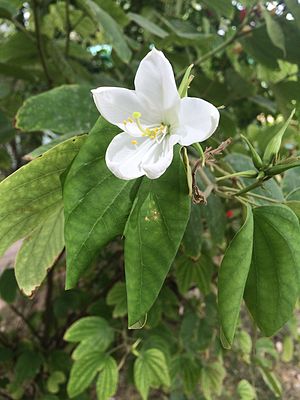Note: This is a project under development. The articles on this wiki are just being initiated and broadly incomplete. You can Help creating new pages.
Bauhinia acuminata
Dwarf white bauhinia is a shrub. It grows up to 3 metres tall. The plant is harvested from the wild for local medicinal use. It is often cultivated as an ornamental and hedge plant in the tropics.
Contents
[hide]- 1 Uses
- 2 Parts Used
- 3 Chemical Composition
- 4 Common names
- 5 Properties
- 6 Habit
- 7 Identification
- 8 List of Ayurvedic medicine in which the herb is used
- 9 Where to get the saplings
- 10 Mode of Propagation
- 11 How to plant/cultivate
- 12 Season to grow
- 13 Required Ecosystem/Climate
- 14 Kind of soil needed
- 15 Commonly seen growing in areas
- 16 Photo Gallery
- 17 References
- 18 External Links
Uses
Acne, Sores, Pimples, Cancer, Diabetes, Thoat infections[1].
Parts Used
Chemical Composition
Phytochemical screening of leaves yielded starch, alkaloids, flavonoids, tannins, reducing sugars, amino acids, and lignins.[2]
Common names
| Language | Common name |
|---|---|
| Kannada | Kanchan, Bilimandara |
| Hindi | Safed Kachnar |
| Malayalam | Mandaaram |
| Tamil | Vellai mandaarai |
| Telugu | Kanchana |
| Marathi | NA |
| Gujarathi | NA |
| Punjabi | NA |
| Kashmiri | NA |
| Sanskrit | Sivamalli |
| English | Dwarf white orchid tree |
Properties
Reference: Dravya - Substance, Rasa - Taste, Guna - Qualities, Veerya - Potency, Vipaka - Post-digesion effect, Karma - Pharmacological activity, Prabhava - Therepeutics.
Dravya
Rasa
Guna
Veerya
Vipaka
Karma
Prabhava
Habit
Identification
Leaf
| Kind | Shape | Feature |
|---|---|---|
Flower
| Type | Size | Color and composition | Stamen | More information |
|---|---|---|---|---|
| {{{5}}} |
Fruit
| Type | Size | Mass | Appearance | Seeds | More information |
|---|---|---|---|---|---|
Other features
List of Ayurvedic medicine in which the herb is used
Where to get the saplings
Mode of Propagation
How to plant/cultivate
Succeeds in full sun to partial shade. Prefers a fertile, well-drained but moisture-retentive soil.[4]
Season to grow
Required Ecosystem/Climate
Grows best in a sunny position[ 200 , 652 ]. Prefers a fertile, moisture-retentive but well-drained, sandy, loamy or gravelly soil.[5]
Kind of soil needed
Requires rich well drained soil.[6]
Commonly seen growing in areas
Dry dipterocarp forest in monsoon regions, Well-drained and sunny places, Dry dipterocarp forests.
Photo Gallery
References
- ↑ Jump up to: 1.0 1.1 1.2 ”Karnataka Medicinal Plants Volume-3” by Dr.M. R. Gurudeva, Page No.803, Published by Divyachandra Prakashana, #6/7, Kaalika Soudha, Balepete cross, Bengaluru
- Jump up ↑ Chemical constituents
- Jump up ↑ [Morphology]
- Jump up ↑ Cultivation
- Jump up ↑ Required Ecosystem/Climate
- Jump up ↑ Kind of soil needed
External Links
- Ayurvedic Herbs known to be helpful to treat Acne
- Ayurvedic Herbs known to be helpful to treat Sores
- Ayurvedic Herbs known to be helpful to treat Pimples
- Ayurvedic Herbs known to be helpful to treat Cancer
- Ayurvedic Herbs known to be helpful to treat Diabetes
- Ayurvedic Herbs known to be helpful to treat Thoat infections
- Herbs with Root used in medicine
- Herbs with Stem Bark used in medicine
- Herbs with Leaf used in medicine
- Herbs with common name in Kannada
- Herbs with common name in Hindi
- Herbs with common name in Malayalam
- Herbs with common name in Tamil
- Herbs with common name in Telugu
- Herbs with common name in Sanskrit
- Herbs with common name in English
- Habit - Shrub
- Index of Plants which can be propagated by Seeds
- Herbs that are commonly seen in the region of Dry dipterocarp forest in monsoon regions
- Herbs that are commonly seen in the region of Well-drained and sunny places
- Herbs that are commonly seen in the region of Dry dipterocarp forests
- Herbs
- Pages without herbs images





